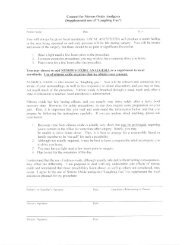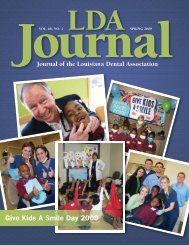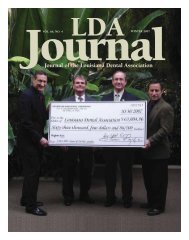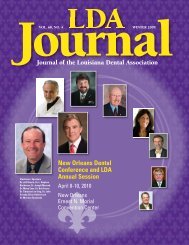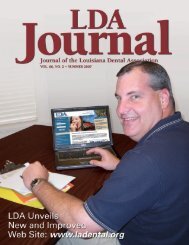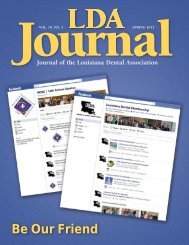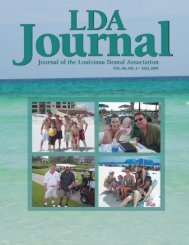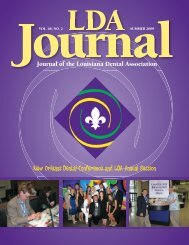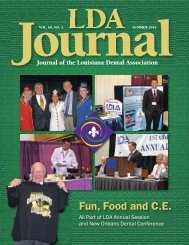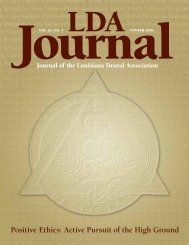Journal of the Louisiana Dental Association Journal of the Louisiana ...
Journal of the Louisiana Dental Association Journal of the Louisiana ...
Journal of the Louisiana Dental Association Journal of the Louisiana ...
Create successful ePaper yourself
Turn your PDF publications into a flip-book with our unique Google optimized e-Paper software.
LDA<br />
guest editorial<br />
Dr. Thomas P. Conaty<br />
Vice Chairman (immediate past), ADA Council on Government Affairs<br />
Non-Pr<strong>of</strong>essional Providers<br />
recently read “A History <strong>of</strong> Minnesota’s <strong>Dental</strong><br />
I Therapist Legislation” written by <strong>the</strong> Minnesota<br />
<strong>Dental</strong> <strong>Association</strong> (MDA). This “history” lists 14<br />
procedures that a dental <strong>the</strong>rapist may perform<br />
as per <strong>the</strong> state’s statutes. The scope <strong>of</strong> practice<br />
includes cavity preparation, restoration <strong>of</strong> primary<br />
and permanent teeth, pulpotomies and extractions <strong>of</strong><br />
primary teeth, as well as prescriptive authority.<br />
However, a dental <strong>the</strong>rapist may not scale teeth<br />
without attending hygiene school because “<strong>the</strong> dental<br />
<strong>the</strong>rapist educational program would have to be<br />
longer if it had to include all <strong>of</strong> <strong>the</strong> hygiene functions<br />
along with <strong>the</strong> surgical and restorative functions.” In<br />
o<strong>the</strong>r words, it’s legal for dental <strong>the</strong>rapists to perform<br />
complex functions performed by dentists, but illegal<br />
to perform hygiene treatment.<br />
Please be assured that I do not intend to be critical<br />
<strong>of</strong> <strong>the</strong> MDA for what happened in <strong>the</strong>ir state after a<br />
long political fight in a very difficult environment. I<br />
feel certain <strong>the</strong>y did <strong>the</strong> best that <strong>the</strong>y could under<br />
overwhelming circumstances.<br />
In 1992, <strong>the</strong> American <strong>Dental</strong> Hygienists’<br />
<strong>Association</strong> (ADHA) published “The <strong>Dental</strong> Hygienist<br />
as Change Agent.” This article delineated a strategic<br />
plan that included increased representation on<br />
boards, administration <strong>of</strong> local anes<strong>the</strong>sia, and also<br />
urged hygienists to seek independent dental hygiene<br />
practice so <strong>the</strong>y could determine treatment plans<br />
and referrals. The ADHA also stated that “dentists<br />
do not have <strong>the</strong> pr<strong>of</strong>essional expertise in dental<br />
hygiene to be effective dental hygiene regulators.” In<br />
a 1993 letter to Hillary Clinton, <strong>the</strong> California <strong>Dental</strong><br />
Hygiene <strong>Association</strong> stated, “… hygienist(s) should<br />
provide <strong>the</strong> services <strong>the</strong>y are currently allowed under<br />
general supervision, without <strong>the</strong> restraint <strong>of</strong> trade<br />
that comes from having to be employed by a dentist.”<br />
Hygienists have also argued that <strong>the</strong>y should be <strong>the</strong><br />
“gatekeepers” for dental services under a national<br />
health insurance plan. One <strong>of</strong> <strong>the</strong>ir first successes<br />
was in Colorado where <strong>the</strong>y advocated for, and<br />
won, unsupervised hygiene practice to serve patients<br />
in impoverished areas. Today, only one <strong>of</strong> <strong>the</strong> 20<br />
unsupervised hygienists work in underserved areas,<br />
and <strong>the</strong>ir fees are equal to or higher than <strong>the</strong> dentists<br />
who work in <strong>the</strong>se communities.<br />
In recent years, as <strong>the</strong> issue <strong>of</strong> access to dental<br />
care has gained even greater national attention<br />
and <strong>the</strong> hygienists joined forces with health care<br />
coalitions, <strong>the</strong>y began to achieve <strong>the</strong>ir goals. With<br />
“workforce change” agendas that are being funded by<br />
<strong>the</strong> Kellogg and Pew foundations and studies by <strong>the</strong><br />
Institute <strong>of</strong> Medicine and HRSA (that do not include<br />
representatives from organized dentistry) for <strong>the</strong><br />
purpose <strong>of</strong> “reorganizing <strong>the</strong> dental delivery system,”<br />
<strong>the</strong> radical hygienists have gained powerful allies.<br />
Our great pr<strong>of</strong>ession needs to stand and fight <strong>the</strong><br />
battle to prevent <strong>the</strong> encroachment by non-dentists<br />
performing irreversible dental treatment. We must<br />
educate ourselves to <strong>the</strong> realities <strong>of</strong> <strong>the</strong> greatest<br />
threat to dentistry in our 150 year history. Let’s arm<br />
ourselves with <strong>the</strong> critical knowledge to save and<br />
preserve for future generations <strong>the</strong> finest dental care<br />
in <strong>the</strong> world. We need an “attitude adjustment” to<br />
resist <strong>the</strong> sea <strong>of</strong> negativity that we are drowning in<br />
today. As I talk to my fellow dentists from across <strong>the</strong><br />
country, I hear statements like –<br />
<br />
<br />
we are.<br />
<br />
<strong>the</strong> station.<br />
<br />
up on <strong>the</strong> menu.<br />
These attitudes will become, and in some cases<br />
have become, a self-fulfilling prophecy. We seem to<br />
have forgotten as a pr<strong>of</strong>ession who we are and what<br />
we have endured and achieved to get to where we<br />
are. We have forgotten <strong>the</strong> great educational disparity<br />
between hygienists and dentists. As one <strong>of</strong> our<br />
national legislative advocates recently said, “Dentists<br />
seem to have lost confidence.”<br />
2 LDA <strong>Journal</strong>



